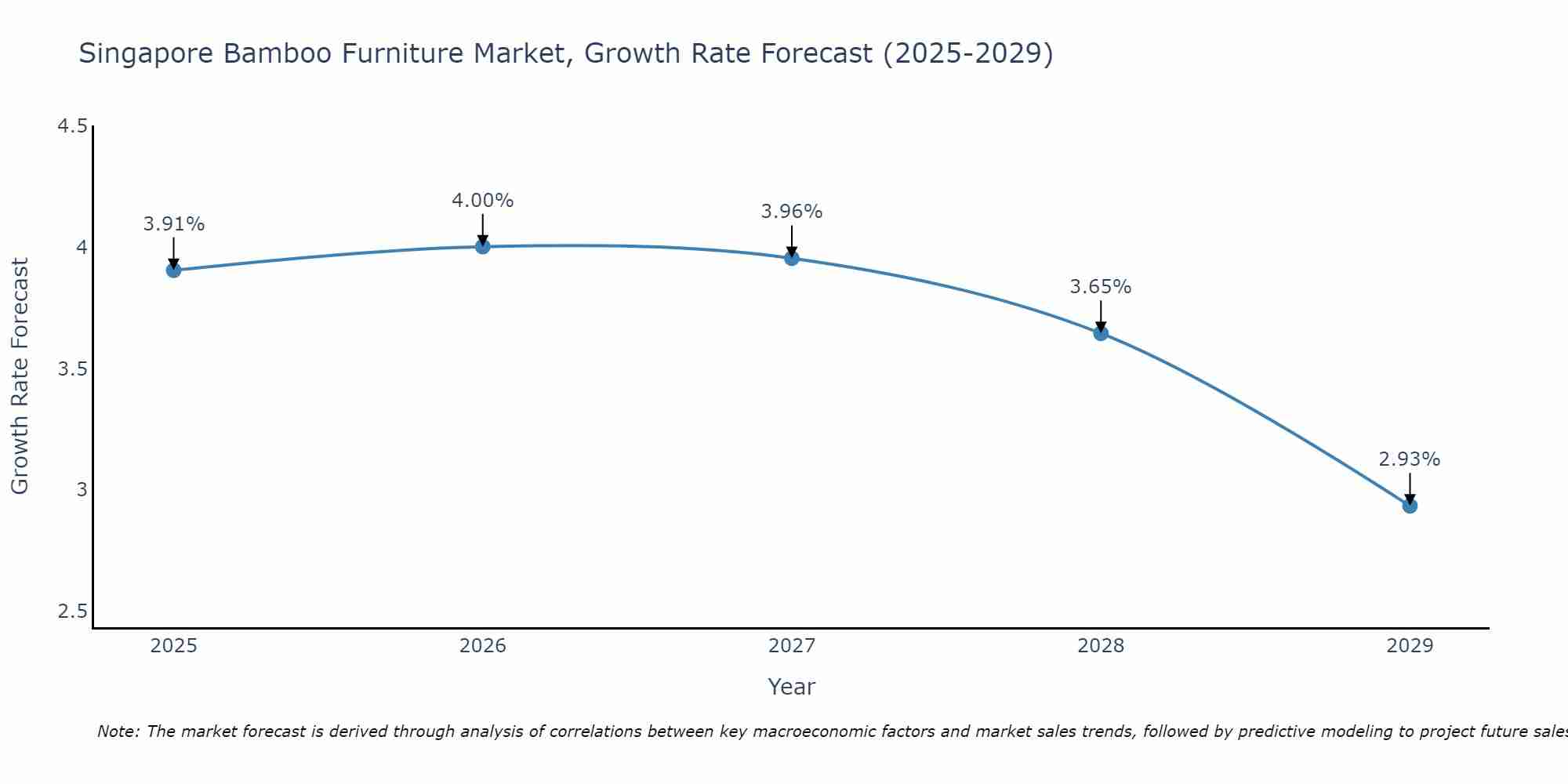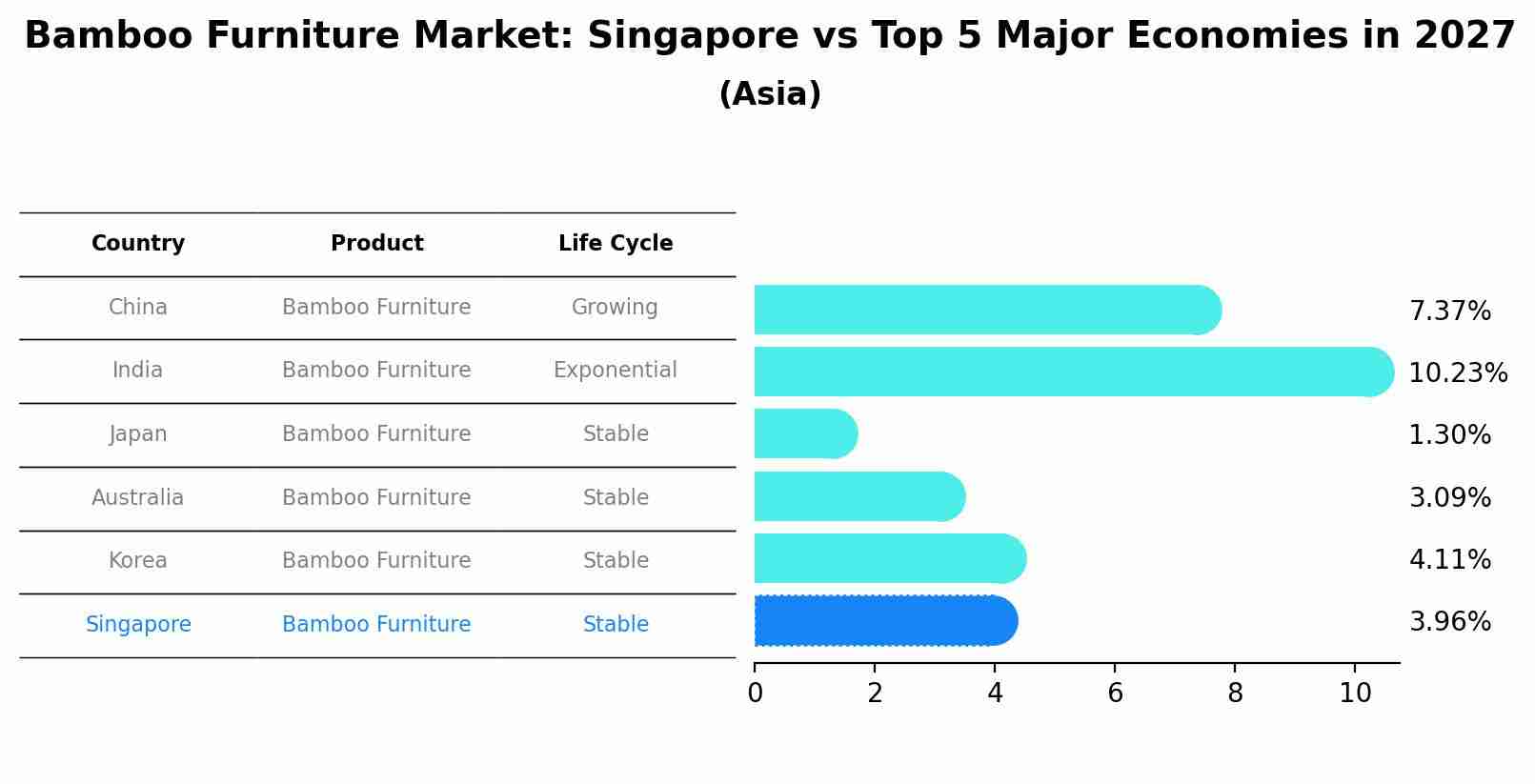Singapore Bamboo Furniture Market (2025-2031) Outlook | Analysis, Value, Trends, Growth, Companies, Revenue, Share, Size, Forecast & Industry
| Product Code: ETC370887 | Publication Date: Aug 2022 | Updated Date: Apr 2025 | Product Type: Market Research Report | |
| Publisher: 6Wresearch | No. of Pages: 75 | No. of Figures: 35 | No. of Tables: 20 | |
Singapore Bamboo Furniture Market Size Growth Rate
The Singapore Bamboo Furniture Market is projected to witness mixed growth rate patterns during 2025 to 2029. Starting at 3.91% in 2025, the market peaks at 4.00% in 2026, and settles at 2.93% by 2029.

Bamboo Furniture Market: Singapore vs Top 5 Major Economies in 2027 (Asia)
By 2027, Singapore's Bamboo Furniture market is forecasted to achieve a stable growth rate of 3.96%, with China leading the Asia region, followed by India, Japan, Australia and South Korea.

Singapore Bamboo Furniture Market Synopsis
The bamboo furniture market in Singapore is set to grow as sustainability and eco-friendly furniture choices gain popularity. Bamboo furniture offers a renewable and durable alternative to traditional wood furniture. The market`s expansion is driven by the increasing environmental consciousness and the desire for stylish and sustainable home furnishings.
Drivers of the Market
The growth of the Singapore bamboo furniture market is driven by factors such as sustainability considerations, eco-friendly design trends, and the versatility of bamboo as a furniture material. Bamboo furniture includes a wide range of indoor and outdoor furniture items made from bamboo and bamboo-based composites. Growth drivers encompass the demand for sustainable and renewable furniture materials, the popularity of minimalist and natural design aesthetics, and the use of bamboo in eco-conscious home decor. As consumers prioritize environmentally responsible choices in furniture, the bamboo furniture market is poised for growth, offering stylish and sustainable options for interior and exterior spaces.
Challenges of the Market
The bamboo furniture market in Singapore encounters challenges concerning sustainability and market competition. Ensuring that bamboo sourcing and production methods are environmentally friendly is vital. Moreover, competing with other materials and furniture types requires creative designs and effective marketing strategies.
COVID-19 Impact on the Market
The bamboo furniture market in Singapore navigated the COVID-19 pandemic with adaptability. While there were temporary disruptions in manufacturing and distribution, the market quickly adjusted. The demand for sustainable and eco-friendly furniture remained steady, with consumers showing increased interest in bamboo furniture. Manufacturers adapted by offering stylish and durable bamboo furniture solutions. The pandemic underscored the importance of sustainable and environmentally friendly home furnishings.
Key Players in the Market
In the Singapore bamboo furniture market, key players such as Greenington LLC, Haiku Designs, and Bamboo54, Inc., specialize in offering eco-friendly bamboo furniture and home d?cor products. Their commitment to sustainable design and bamboo craftsmanship contributes to their market leadership.
Key Highlights of the Report:
- Singapore Bamboo Furniture Market Outlook
- Market Size of Singapore Bamboo Furniture Market, 2024
- Forecast of Singapore Bamboo Furniture Market, 2031
- Historical Data and Forecast of Singapore Bamboo Furniture Revenues & Volume for the Period 2021-2031
- Singapore Bamboo Furniture Market Trend Evolution
- Singapore Bamboo Furniture Market Drivers and Challenges
- Singapore Bamboo Furniture Price Trends
- Singapore Bamboo Furniture Porter's Five Forces
- Singapore Bamboo Furniture Industry Life Cycle
- Historical Data and Forecast of Singapore Bamboo Furniture Market Revenues & Volume By Type for the Period 2021-2031
- Historical Data and Forecast of Singapore Bamboo Furniture Market Revenues & Volume By Chairs & Tables for the Period 2021-2031
- Historical Data and Forecast of Singapore Bamboo Furniture Market Revenues & Volume By Stools for the Period 2021-2031
- Historical Data and Forecast of Singapore Bamboo Furniture Market Revenues & Volume By Beds for the Period 2021-2031
- Historical Data and Forecast of Singapore Bamboo Furniture Market Revenues & Volume By Others for the Period 2021-2031
- Historical Data and Forecast of Singapore Bamboo Furniture Market Revenues & Volume By End User for the Period 2021-2031
- Historical Data and Forecast of Singapore Bamboo Furniture Market Revenues & Volume By Residential for the Period 2021-2031
- Historical Data and Forecast of Singapore Bamboo Furniture Market Revenues & Volume By Commercial for the Period 2021-2031
- Singapore Bamboo Furniture Import Export Trade Statistics
- Market Opportunity Assessment By Type
- Market Opportunity Assessment By End User
- Singapore Bamboo Furniture Top Companies Market Share
- Singapore Bamboo Furniture Competitive Benchmarking By Technical and Operational Parameters
- Singapore Bamboo Furniture Company Profiles
- Singapore Bamboo Furniture Key Strategic Recommendations
Frequently Asked Questions About the Market Study (FAQs):
- Single User License$ 1,995
- Department License$ 2,400
- Site License$ 3,120
- Global License$ 3,795
Search
Related Reports
- ASEAN and Thailand Brain Health Supplements Market (2025-2031) | Strategy, Consumer Insights, Analysis, Investment Trends, Opportunities, Growth, Size, Share, Industry, Revenue, Segments, Value, Segmentation, Supply, Forecast, Restraints, Outlook, Competition, Drivers, Trends, Demand, Pricing Analysis, Competitive, Strategic Insights, Companies, Challenges
- ASEAN Bearings Market (2025-2031) | Strategy, Consumer Insights, Analysis, Investment Trends, Opportunities, Growth, Size, Share, Industry, Revenue, Segments, Value, Segmentation, Supply, Forecast, Restraints, Outlook, Competition, Drivers, Trends, Demand, Pricing Analysis, Competitive, Strategic Insights, Companies, Challenges
- Europe Flooring Market (2025-2031) | Outlook, Share, Industry, Trends, Forecast, Companies, Revenue, Size, Analysis, Growth & Value
- Saudi Arabia Manlift Market (2025-2031) | Outlook, Size, Growth, Trends, Companies, Industry, Revenue, Value, Share, Forecast & Analysis
- Uganda Excavator, Crane, and Wheel Loaders Market (2025-2031) | Strategy, Consumer Insights, Analysis, Investment Trends, Opportunities, Growth, Size, Share, Industry, Revenue, Segments, Value, Segmentation, Supply, Forecast, Restraints, Outlook, Competition, Drivers, Trends, Demand, Pricing Analysis, Competitive, Strategic Insights, Companies, Challenges
- Rwanda Excavator, Crane, and Wheel Loaders Market (2025-2031) | Strategy, Consumer Insights, Analysis, Investment Trends, Opportunities, Growth, Size, Share, Industry, Revenue, Segments, Value, Segmentation, Supply, Forecast, Restraints, Outlook, Competition, Drivers, Trends, Demand, Pricing Analysis, Competitive, Strategic Insights, Companies, Challenges
- Kenya Excavator, Crane, and Wheel Loaders Market (2025-2031) | Strategy, Consumer Insights, Analysis, Investment Trends, Opportunities, Growth, Size, Share, Industry, Revenue, Segments, Value, Segmentation, Supply, Forecast, Restraints, Outlook, Competition, Drivers, Trends, Demand, Pricing Analysis, Competitive, Strategic Insights, Companies, Challenges
- Angola Excavator, Crane, and Wheel Loaders Market (2025-2031) | Strategy, Consumer Insights, Analysis, Investment Trends, Opportunities, Growth, Size, Share, Industry, Revenue, Segments, Value, Segmentation, Supply, Forecast, Restraints, Outlook, Competition, Drivers, Trends, Demand, Pricing Analysis, Competitive, Strategic Insights, Companies, Challenges
- Israel Intelligent Transport System Market (2025-2031) | Strategy, Consumer Insights, Analysis, Investment Trends, Opportunities, Growth, Size, Share, Industry, Revenue, Segments, Value, Segmentation, Supply, Forecast, Restraints, Outlook, Competition, Drivers, Trends, Demand, Pricing Analysis, Competitive, Strategic Insights, Companies, Challenges
- Uganda Precast and Aggregate Market (2025-2031) | Strategy, Consumer Insights, Analysis, Investment Trends, Opportunities, Growth, Size, Share, Industry, Revenue, Segments, Value, Segmentation, Supply, Forecast, Restraints, Outlook, Competition, Drivers, Trends, Demand, Pricing Analysis, Competitive, Strategic Insights, Companies, Challenges
Industry Events and Analyst Meet
Our Clients
Whitepaper
- Middle East & Africa Commercial Security Market Click here to view more.
- Middle East & Africa Fire Safety Systems & Equipment Market Click here to view more.
- GCC Drone Market Click here to view more.
- Middle East Lighting Fixture Market Click here to view more.
- GCC Physical & Perimeter Security Market Click here to view more.
6WResearch In News
- Doha a strategic location for EV manufacturing hub: IPA Qatar
- Demand for luxury TVs surging in the GCC, says Samsung
- Empowering Growth: The Thriving Journey of Bangladesh’s Cable Industry
- Demand for luxury TVs surging in the GCC, says Samsung
- Video call with a traditional healer? Once unthinkable, it’s now common in South Africa
- Intelligent Buildings To Smooth GCC’s Path To Net Zero













